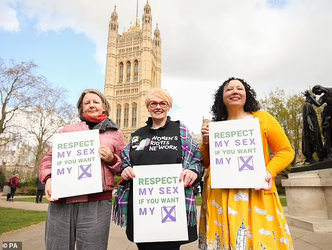
It is perfectly legal for public bodies and businesses to limit services to a single sex, the equalities watchdog declared today in a boost for women's rights.
There has long been uncertainty over whether services such as refuges for female rape victims are allowed to exclude trans people who were born as a man.
Today the Equality and Human Rights Commission (EHRC) said that service providers wishing to limit services to a single sex are legally able to do so, provided the reasons are justified and proportionate.
The new guidance will have huge ramifications for hospitals, retailers, hospitality and sports clubs which have faced difficult issues in recent years under pressure from the trans lobby.
It makes it clear that it is legal for a gym to limit communal changing rooms to a single sex, as long as a gender neutral changing room is also provided for trans people.
Other services which can legally exclude trans people include rape counselling for women, women's refuges and women's fitness classes.
Toilets can also be legally limited to men and women with separate gender-neutral facilities.
The key point is that public services and businesses must be able to show they have taken the views of trans people into account.
Baroness Falkner, chairman of the EHRC, said: 'Our mission at the EHRC is to protect the rights of everyone and ensure that people across Britain are treated fairly.
'There is no place for discrimination against anyone based on their sex or gender reassignment.
'Where rights between groups compete, our duty as an independent regulator is to help providers of services and others to balance the needs of different users in line with the law.
'Organisations are legally allowed to restrict services to a single sex in some circumstances. But they need help to navigate this sensitive area. That is why we have published this guidance - to clarify the law and uphold everyone's rights.'
Maya Forstater, executive director of the campaign group Sex Matters, said: 'The guidance is a very positive step forward.
'It gives service providers clarity that it is lawful to provide services for men and women separately and to expect people to follow the rules.
'Stonewall has been telling organisations that they have to replace sex with gender identity and that anyone who disagrees is a bigot, but the EHRC is going back to the Equality Act.
The key point is that public services and businesses must be able to show they have taken the views of trans people into account.
Baroness Falkner, chairman of the EHRC, said: 'Our mission at the EHRC is to protect the rights of everyone and ensure that people across Britain are treated fairly.
'There is no place for discrimination against anyone based on their sex or gender reassignment.
'Where rights between groups compete, our duty as an independent regulator is to help providers of services and others to balance the needs of different users in line with the law.
'Organisations are legally allowed to restrict services to a single sex in some circumstances. But they need help to navigate this sensitive area. That is why we have published this guidance - to clarify the law and uphold everyone's rights.'
Maya Forstater, executive director of the campaign group Sex Matters, said: 'The guidance is a very positive step forward.
'It gives service providers clarity that it is lawful to provide services for men and women separately and to expect people to follow the rules.
'Stonewall has been telling organisations that they have to replace sex with gender identity and that anyone who disagrees is a bigot, but the EHRC is going back to the Equality Act.
'The examples appear to encourage blanket bans, rather than by a case-by-case decision making, and cover restricting access to day to day settings like bathrooms and gym classes, which is extraordinary.
'This leaves more, not less confusion, and more, not less, risk of illegal discrimination.'
The EHRC said its guidance will help service providers to make lawful decisions about any services they offer to women and men separately.
It advises organisations such as hospitals, retailers, hospitality and sports clubs to put in place policies that are both legal and balance the needs of different groups.
The guidance confirms that service providers wishing to limit services to a single sex are legally able to do so, provided the reasons are justified and proportionate.
Under the Equality Act, services cannot discriminate against someone because of the protected characteristics of sex or gender reassignment.
But the Act includes 'exceptions' which allow organisations lawfully to exclude, modify, or limit access to certain groups in certain circumstances.
In the case of separate or single-sex services, providers must show that providing the service differently is a 'proportionate means of achieving a legitimate aim'.
This could be for reasons of privacy, decency, to prevent trauma or to ensure health and safety.
For example, if women of a particular religion or belief will not use the local swimming pool at the same time as men, women-only swimming sessions could be provided as well as mainly-mixed sessions.
Single-sex wards in hospitals and nursing homes would be fine if a woman might reasonably object to the presence of a man, or vice versa.
If a group counselling session is provided for female victims of sexual assault, the organisers would be able to bar trans women to attend as they judge that the clients who attend the group session are likely to be traumatised by the presence of a person who is biologically male.
A leisure centre could introduce some female-only fitness classes, excluding trans women because of the degree of physical contact involved in such classes.
In a gym with separate-sex communal changing rooms, the guidance said there could be concern about the safety and dignity of trans men changing in an open plan environment.
The gym could therefore introduce an additional gender-neutral changing room with self-contained units.